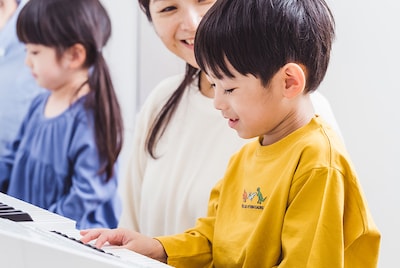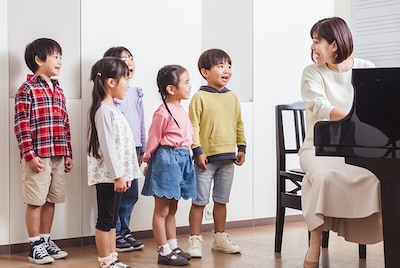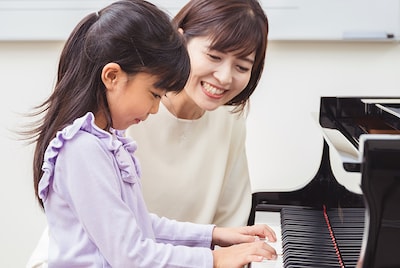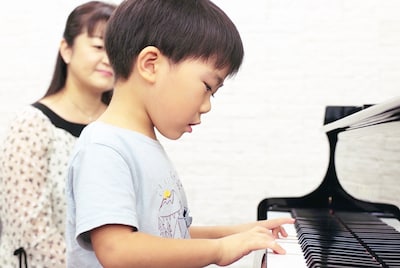PRIMARY for 3-year-olds
New course from 3-year-olds.
Make music a gift for a lifetime! Through Piano and Electone playing, we nurture the ability to enjoy music freely.
Growing up significantly! Period of the age 3 to 5-year-olds!
Three-year-olds children love to imagine. Four and five-year-olds children grow the ability to discern music. (hearing skills) In Yamaha's lesson, they will start to expand imagination through music and nurture the sence of music.
Let's take a look at the actual lesson and see the key features of this lesson!
Yamaha's "Timely Education" fosters the development of skills during the optimal growth period
Children have periods when certain abilities undergo significant development. Because the lessons are tailored to the child's growth, it becomes possible to maximize the enhancement of skills that develop at that particular age.
What is the advantage of learning Music from the age of 3?
At the age of three, children enter a special period where they immerse themselves in the world of imagination and become capable of expressing themselves with a certain flair. It is important to have a rich input of experiences of exposure to and enjoyment of quality music, so that they can express themselves without being shy in the future.
Three years old is the perfect time to start! Now is the time to shower them with rich music and let them fully enjoy the experience.
In PRIMARY for 3-year-olds, children not only listen to and sing music from various genres while envisioning images but also have fun playing the piano or electone, incorporating elements of play. We highly recommend starting this journey from the age of three, for families who wish their children to cherish music as a lifelong treasure and aspire for them to become proficient in playing musical instruments.
"Playing" at age 3. Aiming to have one's own image and express oneself.
When it comes to playing a musical instrument, adults tend to think whether they can move their fingers quickly or they can read scores.Yamaha Music School believes that "playing" is not limited to these abilities, but that it is important to have an image of "how you want to play" and to be able to play with feeling while listening carefully to the sound. Accumulating the experience of "playing" without strain will lead to a rich performance expression unique to the child.
Features
Yamaha's distinctive method will give children the ability to enjoy music throughout their life, even as an adult.
Children go through more than 140 songs over three years. One of the key features of "PRIMARY" course is Yamaha’s distinctive method, where children learn each song through the four steps of “listening,” “singing,” “playing,” and “reading.” Using keyboard instruments such as piano or Electone, we nurture the fundamental skills of music and the ability to express oneself freely.

Social skills, perseverance, and concentration cultivated through Yamaha's lessons.
In addition to the skills required to play a keyboard instrument, children also nurture “non-cognitive skills” such as cooperativeness, social skills, perseverance, and concentration through Yamaha's lesson.

Instruction delivered by certified Yamaha teachers, ensuring consistent skill development.
Teachers certified by Yamaha have extensive musical knowledge and excellent communication skills with young children.

Comprehensive tools to support practice at home
Yamaha offers various tools to support practicing at home. These tools filled with Yamaha’s own creativity include videos that show the key points in practice and an app to pique their interest to help them practice while having fun. *The "App" is available from "PRIMARY for 4-5-year-olds" course.
Combination of group lessons and individual lessons for an enhanced musical experience!
In addition to the unique experiences possible in group lessons, individual lessons provide personalised instruction on playing and reading. With meticulous support tailored to each individual, we enhance the overall group lesson experience.
*The basic lesson format is 'group lessons only' for PRIMARY for 3-year-olds, while PRIMARY for 4-5-year-olds consists of 'group lessons + one individual lesson per month.'
Additional
"PRIMARY PERSONAL" to start with private lessons only.
Keeping the concept of "foster the development of skills during the optimal growth period", private piano or electone lessons will help children acquire the fundamental skills of music and the ability to express themselves freely.

Lesson details
PRIMARY
Age range
・ 3-year-olds
Lesson Style
・ Group lesson 3 times / month + Supplementary individual lesson 0-3 times / month
*Only group lesson is recommendation for PRIMARY.
Time
・ Group lesson: 50 minutes
・ Supplementary individual lesson: 20 minutes
PRIMARY PERSONAL
Age range
・ 3-year-olds
Lesson style / time
・ Individual lesson / 30 minutes per lesson
Voices from the Experts
One key term in early childhood education is 'self and social competence'. "Self competence" encompasses self-esteem, self-armation, motivation, the ability to control one's actions, and perseverance.
The sense of "I can do it if I try!" becomes a fundamental source of children's confidence throughout their future, making the early years crucial in shaping their experiences. The age of three is a significant period when children explore their interests by engaging in various experiences, asking themselves, "What possibilities do I have?". Another aspect of "social competence" is the ability to navigate interactions effectively with others. When a child encounters someone who plays an instrument better, it can foster a desire for improvement and internal motivation, leading to a sense of wanting to play better and produce beautiful sounds. When playing with others, children naturally listen attentively to different sounds. In essence, music facilitates mutual understanding, empathy, and compassion. Furthermore, the remarkable aspect of music is its impact on the brain-listening to music involves processing information and various interpretations, fostering cognitive development. Engaging passionately with music not only brings joy but also nurtures intellectual growth.
- Professor Toshihiko Endo:
- Professor at the Graduate School of Education, The University of Tokyo, and also serves as the Director of “CEDEP”, i.e. the Center for Early Childhood Development, Education, and Policy Research, an aliated institution of the university. His areas of expertise include developmental psychology, emotional psychology, lutionary psychology.
Q&A
Yamaha Music School emphasizes comprehensive musical development for young learners.
Unlike private piano lessons that focus mainly on reading and playing music, our curriculum, encompassing "listening, singing, playing, reading, and creating," cultivates fundamental music skills effectively.
While it may seem different at first, this approach lays a robust foundation for 6 to 7-year-olds, whose fingertips are rapidly developing, paving the way for solid performance skills.
"I can play more. I can listen more."is the concept of the new PRIMARY.
We restructured the Music Wonderland(3-year-olds) and Junior Music Course(4-5-year-olds) and integrated, and updated into a new PRIMARY.
The major difference between this course system and our previous ones is that we provide instruction tailored to each child's individual needs to ensure that they develop the ability to play.
By combining group lesson and individual lessons, we provide lesson that will help your children develop their "Playing ability" in an individualized manner.
This is a uniform nationwide lesson system that only Yamaha, with this well-trained teachers and well-equipped venues, can offer.
In PRIMARY, children will start to listen the music and watch the video at home and shift to play the instrument little by little.
Since the focus is on "reviewing" the lesson content, repeating what has been done will give your child confidence and motivation for the next lesson and practice.
In addition, coloful and fun workbook is also provided. Using sickers and crafts, children can create imaginatively and learn the elements of music in a fun way.
Children will be able to play 140 songs in various keys with both hands.
Since they will experience many genres of music, they will acquire not only the ability to play a song,
but also the basic ability to feel the nuances of the song with their bodies and to play the song with an appropriate expression that will resonate with others.
We ask all children to have own instruments ready by around first half of the PRIMARY lesson.
When considering tone color, range and playing posture, we recommend that chilren use a piano or Electone rather than a portable keyboard.
Before purchasing an electronic piano, please make sure that it has 88 keys, and check the key board touch and functions.
In PRIMARY lesson for 3-year-olds,we ask you parents to accompany your child as you watch the children receptive to music as "fun" and "beautiful".
Parents are asked to sit next to their children during lessons, but we gradually shift our focus toward children’s independence in the later lesson for 4-year-olds.
And in the third year of PRIMARY lesson, accompaniment by parents will be voluntary.
Younger children are welcome to enter the room.
We understand that they may cry, but in such cases, we ask that you please leave the lesson room once with younger child and come back in after they have calmed down.
Please be assured that your teacher will be watching your older child closely during the time.
Individual lessons are tailored to each child's individual needs, complementing the group lessons and covering repertoire specifically designed for individual lessons.
Basically, we recommend that students take only group lessons in PRIMARY lesson for 3-year-olds, and they take group lessons plus one individual lesson per month in PRIMARY lesson for 4-5-year-olds and up.
But you may choose the number of individual lessons you wish to have. We will confirm your wishes before you enroll in the PRIMARY lesson for 4-5-year-olds.
So you do not have to decide at the time of enrollment. It is also possible to change the number of lessons during the course.






